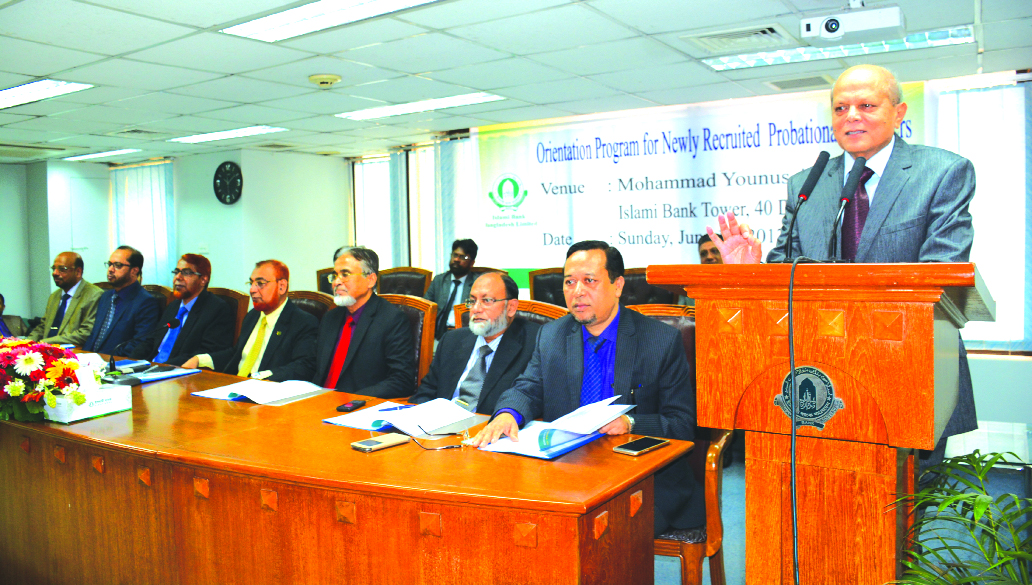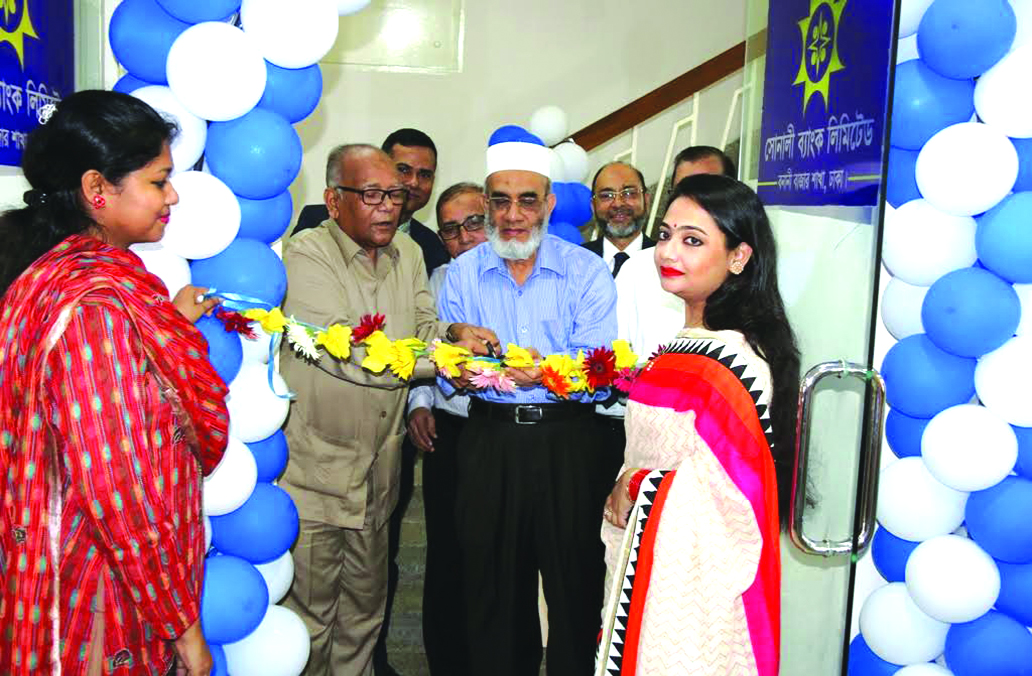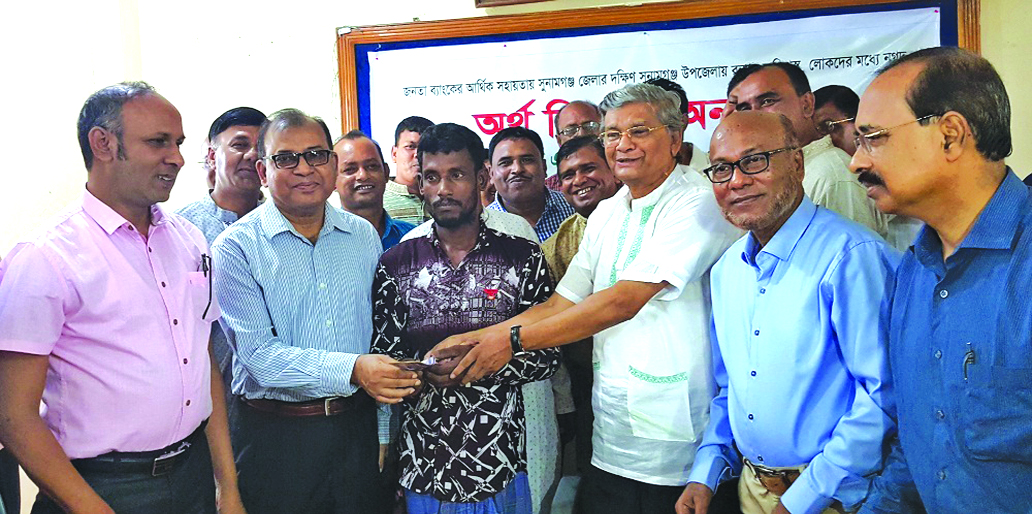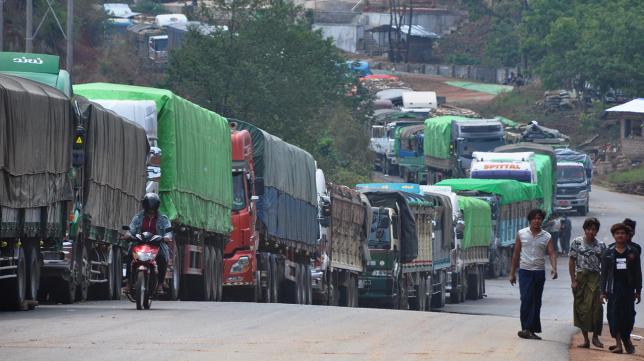Banking
Md. Abdul Hamid Miah, Managing Director of Islami Bank Bangladesh Limited, addressing in an orientation programme for newly joined probationary officers at the banks head office in the city on Sunday. Dr.Mahmood Ahmed, DG of the bank's training & research
 Md. Abdul Hamid Miah, Managing Director of Islami Bank Bangladesh Limited, addressing in an orientation programme for newly joined probationary officers at the banks head office in the city on Sunday. Dr.Mahmood Ahmed, DG of the bank\'s training & researc
Md. Abdul Hamid Miah, Managing Director of Islami Bank Bangladesh Limited, addressing in an orientation programme for newly joined probationary officers at the banks head office in the city on Sunday. Dr.Mahmood Ahmed, DG of the bank\'s training & researc
Amin Uddin Ahmed, Deputy Managing Director of Sonali Bank Limited, inaugurating a new Bhaban of Banani Bazar branch in the city on Sunday. Morshed Alom Khandoker, GM of Dhaka-1 and Md Nurul Islam, GM of the bank were also present.
 Amin Uddin Ahmed, Deputy Managing Director of Sonali Bank Limited, inaugurating a new Bhaban of Banani Bazar branch in the city on Sunday. Morshed Alom Khandoker, GM of Dhaka-1 and Md Nurul Islam, GM of the bank were also present.
Amin Uddin Ahmed, Deputy Managing Director of Sonali Bank Limited, inaugurating a new Bhaban of Banani Bazar branch in the city on Sunday. Morshed Alom Khandoker, GM of Dhaka-1 and Md Nurul Islam, GM of the bank were also present.
State Minister for Finance MA Mannan and Md Abdus Salam, Managing Director of Janata Bank Limited, handing over cash financial support among the flood afected people of Sunamganj area recently. Md Helel Uddin, DMD of the bank was also present.
 State Minister for Finance MA Mannan and Md Abdus Salam, Managing Director of Janata Bank Limited, handing over cash financial support among the flood afected people of Sunamganj area recently. Md Helel Uddin, DMD of the bank was also present.
State Minister for Finance MA Mannan and Md Abdus Salam, Managing Director of Janata Bank Limited, handing over cash financial support among the flood afected people of Sunamganj area recently. Md Helel Uddin, DMD of the bank was also present.
Experts focus on joint efforts of BB, customs
Compliance one of the greatest concerns for banks
A collective effort of Bangladesh Bank (BB) and the customs authority should be taken immediately to check trade-based money laundering (TBML) in the country, senior bankers and experts have said.
They also said the commercial banks need to be more serious regarding legal compliance and identifying right prices for both exportable and importable products to address TBML.
The observations came during discussion at a review workshop on 'Trade Services Operations of Banks', held at Bangladesh Institute of Bank Management (BIBM) in the capital on Sunday with BIBM Director General Dr. Toufic Ahmed Chowdhury in the chair.
Compliance is already one of the greatest concerns for the banks, and greater compliance requirements are affecting operational costs of trade financing, according to a study. It was presented by BIBM Director (Training) Professor Dr. Shah Md. Ahsan Habib at the workshop.
However, compliance to Anti-Money Laundering (AML) rules is essential and should be a collective concern, the study added.
"To hide profitable use of the proceeds of crime through illicit outflows of funds from Bangladesh the criminals use over-pricing in import, generally in case of low-duty items, like - capital machineries, raw materials and spare-parts, and under-pricing of export," the study explained.
The BIBM's findings came against the backdrop of rising trend of illicit fund outflows from Bangladesh in the recent years.
A substantial amount of fund, ranging between 12 per cent and 17 per cent of its total trade value, had annually flown out of Bangladesh during the last one decade, ending in December 2014, through trade mis-invoicing and other illegal transfers.
Global Financial Integrity (GFI), a Washington-based research organisation, unveiled the estimate in its latest report titled 'Illicit Financial Flows to and from Developing Countries: 2005-2014'.
According to the latest estimation, illicit financial outflows from Bangladesh stood at $9.10 billion in 2014, and it is 13 per cent of the total trade in the year under review.
"Considering the concerning issues of trade-based money laundering, compliance requirements, and other financial crimes, regulatory supervision and reporting became crucial," BB Deputy Governor S K Sur Chowdhury said while speaking at the workshop as the chief guest.
He also said the returns or statements are important tools for monitoring and reporting, which are of great importance to the central bank that includes both on-line and off-line reporting.
"Adequate and reliable information on operations, process and trends in different trade services activities are crucial for bankers, academicians and researchers of the relevant fields for improving trade services," he explained.
However, contribution in trade financing, offered by the country's private commercial banks (PCBs) has increased gradually, while trade finance facilities of the state-owned commercial banks (SoCBs) have squeezed.
The country's major portion of trade financing facilities were offered by the PCBs that ranged between 57 per cent and 73 per cent during the financial years (FY) 2011-16, while the SoCBs offered between 33 per cent and 25 per cent, according to the study.
The contribution of the foreign commercial banks (FCBs) was around 3.0 per cent to 5.0 per cent, it added.
"The PCBs are now overtaking the SoCBs in terms of both the number of trade transactions and the trade volume," said Mehmood Husain, Managing Director and Chief Executive Officer of NRB Bank Limited.
Such contributions of the PCBs may increase in the coming years, he opined.
Helal Ahmed Chowdhury, Supernumerary Professor of BIBM and Independent Director of Islami Bank Bangladesh Limited (IBBL), said the PCBs are now dominating trade financing despite larger network of the SoCBs.
"The banks should be ascertained pricing of importable items using internet to avoid trade-based money laundering," he noted.
Among others, Syed Mohammad Bariqullah, faculty member of BIBM and former deputy managing director of National Bank Limited, and Mahbub ul Alam, deputy managing director of IBBL, also spoke on the occasion.
China freezes 1,000 bank accounts of Burmese traders
 Transactions in Muse are becoming difficult as Chinese banks have frozen over 1,000 bank accounts with estimated deposits of Ks40 billion (US$29.42 million) belonging to Burmese traders on Wednesday, June 14, 2017. In the photo, trucks at Muse 105-mile trade camp in Shan State of Myanmar
Transactions in Muse are becoming difficult as Chinese banks have frozen over 1,000 bank accounts with estimated deposits of Ks40 billion (US$29.42 million) belonging to Burmese traders on Wednesday, June 14, 2017. In the photo, trucks at Muse 105-mile trade camp in Shan State of Myanmar
Over 1,000 accounts of Burmese traders were frozen by Chinese banks.
Transactions in Muse are becoming difficult as Chinese banks have frozen over 1,000 bank accounts with estimated deposits of Ks40 billion (US$29.42 million) belonging to Burmese traders.
“They started freezing our bank accounts on June 14. Most were locked the next day,” said a trader.
Also READ: Chinese bankers flock to Hong Kong as expats retreat
Although Chinese banks have blocked bank accounts in the past, it has never been done on such a large scale before.
“They freeze the bank accounts of exporters and importers. For instance, if we transfer money to buy goods, the Chinese trader, who accepts the transfer, is also banned so we cannot issue the goods. We heard that the authorities froze the bank accounts linked with internet gambling and smuggled goods. Now more accounts are frozen. Previously, they only froze accounts which are associated with bean, rice, sugar and maize exporters or money changers. Now the importers who open accounts at Chinese banks to buy goods are included in the banned list. Some have opened their accounts for medical treatment,” said a trader from Muse.
Normally the Chinese banks can settle a bank account within six months if it is frozen. However, some can be frozen for years. Muse accounts for about 70 percent of total border trade and the government should prevent financial loss for its traders, business representatives said.
“It mostly happens when we use illegal money transfers in China. Both governments need to negotiate officially permitting exports from Myanmar. The Chinese didn’t freeze the bank accounts of traders from other countries. They are only doing it to us. Many of us use illegal money transfers as they are cheaper than transfer services approved by the Chinese. The bank accounts frozen by the Chinese are often of money earned legally,” said a trader.
Traders say they will ask the government to make money transfer services official to protect them against Chinese government action and to register all exports to avoid seizures.
news:daily star/19-jun-2017


